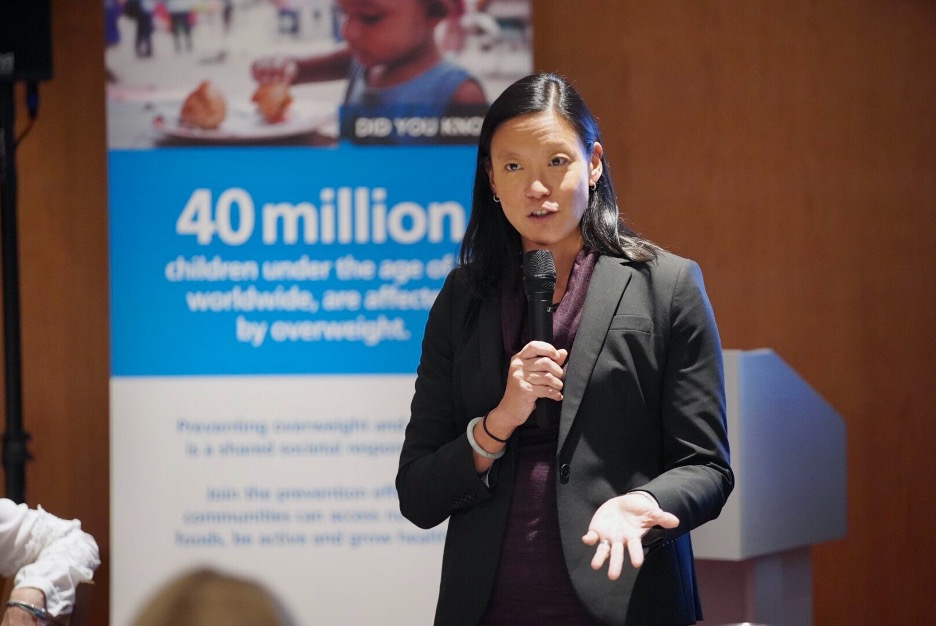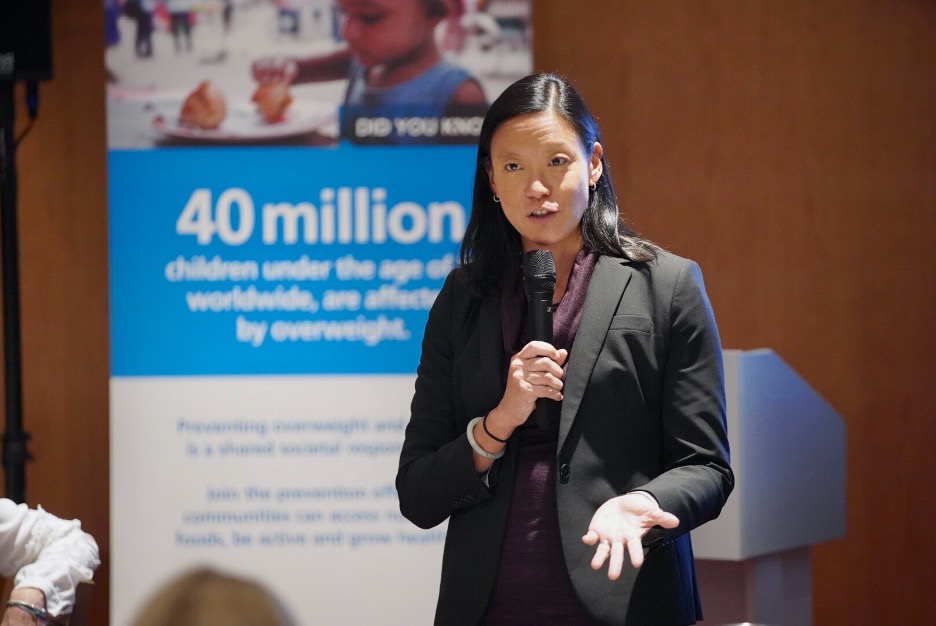Christina Chang is Vital Strategies’ Executive Vice President and Deputy CEO, based out of the New York office—the city where she was born and raised. Since joining Vital Strategies in 2019, she has provided executive leadership in identifying strategic opportunities, developing partnerships and driving innovation across programs and our global offices.
Christina holds a master’s degree in public policy from Harvard University’s John F. Kennedy School of Government and a bachelor’s degree from Stanford University. She serves on the boards of the National Asian Pacific American Women’s Forum and Public Health Solutions.
We sat down with Christina to learn about her public health journey, what excites her about the work she does at Vital Strategies—including a new initiative she is looking forward to—and what she loves about living and working in New York City.

What brought you to the field of public health?
Early in my career I worked as a policy assistant in Hong Kong, just prior to the handover of Hong Kong from the British to the Chinese. I worked on a whole range of issues, from community and economic development to health policy and education. After that, I went back to graduate school for public policy and decided to focus on health policy, and that’s where I ended up working–mostly on issues of health insurance and health care access.
I worked as a policy analyst at the Kaiser Family Foundation in Washington, D.C. and then moved back to New York City to work in the Mayor’s Office, in an office that was dedicated to connecting low-income people who were eligible for public insurance programs but were not enrolled. It was a similar portfolio of work to what I had undertaken at Kaiser but moved from policy to practice. It was only at the tip of the iceberg for me.
I ended up getting an opportunity to work at the New York City Department of Health and I have to say, I didn’t fully understand what public health was until I got there. It opened up to me the idea that achieving good health and wellbeing extends far beyond what you can achieve through health care. I worked on a range of issues, such as tobacco control, food policy, obesity prevention, alcohol policy and substance use. It showed me how much more impactful the tools of public health are. Through prevention and policy, you can achieve so much more than you can through the more limited focus of health insurance and access to health care delivery systems.
After working at the health department, I moved to Planned Parenthood of New York City where I was the Chief External Affairs Officer. My portfolio included communication, community mobilization, advocacy and our legislative and regulatory work. After six years, I was looking for a change. I had been following the work of Vital Strategies through former colleagues at the health department. When there was an opportunity to get back into broader public health work and apply what I had learned in a global context, I jumped at the chance.
What excites you the most about the work you do at Vital Strategies?
I’m excited by my purview over our program portfolio and being able to identify areas for collaboration and synergy. It’s easy for us to fall into silos whether it be road safety, food policy or tobacco control, but our work is more than that. I enjoy finding those opportunities to demonstrate how Vital Strategies is more than the sum of our parts.
I’ve been working with our country offices to build and foster connections so that government partners see Vital Strategies’ work as a collective resource to build and strengthen public health systems rather than as separate and disparate programs. For example, in our newest office in Ethiopia, we are helping to strengthen the civil registration and vital statistics system to help the Ministry of Health more accurately identify the leading causes of death and injury. This data will show the health burden from heart disease, injuries such as car crashes, and air pollution, all of which are areas we work on. This information can then be used to drive decision-making investment in noncommunicable diseases and injuries. It is an example of the synergy and connectedness of our work where we can connect those dots and demonstrate the value that we can add across all of our programs.
What are some new projects or initiatives at Vital Strategies that you are looking forward to?
For me, the ability to control your reproductive destiny is fundamental to health, wellbeing, and living your life to its fullest potential. This is a passion of mine, so I am very excited about our new sexual and reproductive health program.
I was thrilled that I was able to contribute to setting up this new initiative here at Vital Strategies, in some ways creating a bridge from my work at Planned Parenthood to Vital. It’s exciting, but it’s also humbling because of the complexities of advancing this work in countries that are so different from one other, making it critical that we listen to and work with our local partners to identify and support the most effective interventions in their context.
Where do you live and what do you enjoy most about it?
I live in New York City where I was born and raised. I’ve lived in a lot of other places but whenever I return to New York, I appreciate it more than ever. What do I love about the city? Well, it’s the easy stuff like the food, cultural opportunities—there’s always 1,001 things you can be doing. It’s a great place to raise kids because they’re exposed to all that. But what I really love about New York is that you are always in situations—in subways, walking down streets—where you sometimes literally rub shoulders with people with different perspectives, different backgrounds. It’s easy to focus on that difference, but when you engage, you realize that there’s so much more that we have in common. You discover that all the time—a common strain of humanity; we share the same hopes, dreams, loves and annoyances of city living.
Who or what inspires you?
I love being around people who are so passionate about something that they help you love and appreciate it too. You can hear it in their voice when they speak about something that is so important to them, so fundamental to their core. It doesn’t necessarily matter what that passion is; public health, art, sports, or glass blowing. It could be anything. For me it is just inspirational to see people with that kind of calling.
What advice would you give to those interested in entering the public health field?
Public health is a very large field—you can enter as an epidemiologist, physician, advocate, policy analyst, organizer or scientist. What I say to people is, figure out what you’re good at. Find your niche, and really try to excel at it. But here’s where my advice may seem a little contradictory: don’t limit yourself. Keep yourself open to exploring how all these different components work together to advance health and help people live longer, healthier lives. It goes back to breaking down silos of perspectives and tools that we have and seeing how we bring them all together to advance a certain area.
You can use the tools you learn and apply them to a whole range of public health issues. That is one of the great potentials of this field. There are so many areas where you can engage that you will continue to learn and grow your entire career. You’re never going to be bored. Figure out what you are passionate about, what you’re good at and keep yourself open to where you apply it and how you apply it. At the same time, keep yourself open to colleagues who are experts in their own specific areas. That’s how you create the magic together of really being able to integrate and innovate.
Follow us on Twitter: @VitalStrat
About Vital Strategies
Vital Strategies is a global health organization that believes every person should be protected by a strong public health system. We work with governments and civil society in 73 countries to design and implement evidence-based strategies that tackle their most pressing public health problems. Our goal is to see governments adopt promising interventions at scale as rapidly as possible.
